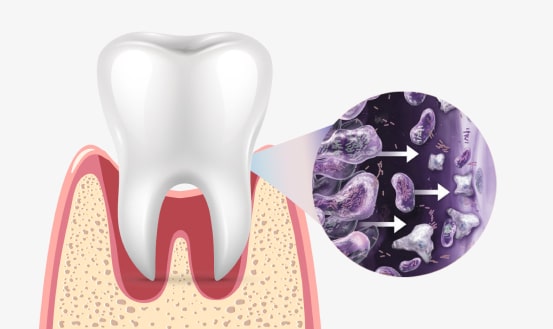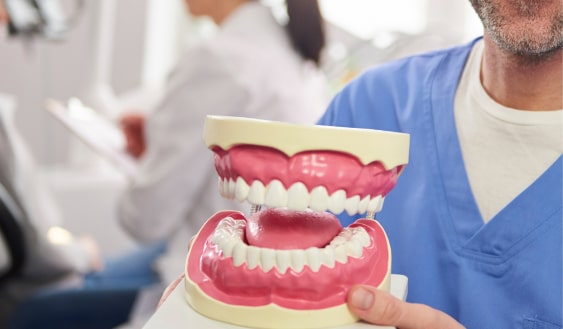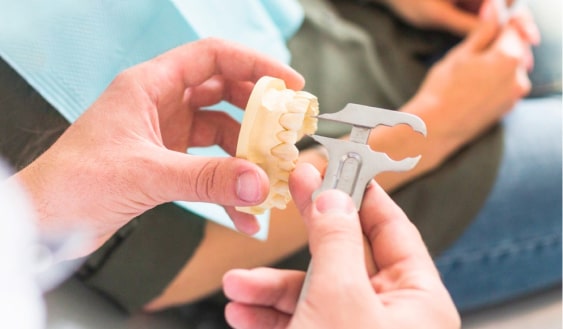The Connection Between Oral Health and Overall General Health
According to ongoing studies and research, it has been stated that the mouth is connected to the rest of the body organs and there is a significant link between one’s dental health and physical, psychological, mental, and social well-being.
Generally, good oral health is thought to be all about having a pearly white smile, healthy gums, and fresh smelling breath, which in turn provides confidence and approachability. Keeping these benefits of oral health in mind, most people visit their family dentist to seek dental work and achieve the same. However, it must be surprising to hear that the benefits of maintaining oral health are not limited to the mouth. It extends to the entire body and can have an impact on an individual’s quality of life. Even then, the marked effect of a healthy mouth on overall health is often overlooked and underappreciated by most of us!
So how does oral health correlate with the rest of the body? Read on to learn about the inseparable relationship between oral health and overall health and what benefits there are for people who maintain their oral health.
Oral Health Is Identified as One of the 10 Leading Health Indicators:
Reports from surveys conducted on the healthy US population have identified oral health issues as a leading health indicator. Good oral health enables people to speak and eat, chew and swallow with ease, smile confidently, and have fresh-smelling breath It also allows better communication, balanced nutrition, good human relationships, and financial prosperity. However, poor dental health, especially in people who don’t have access to dental care, can lead to serious complications like disabling, painful, and costly medical conditions and diseases.
With healthy diet choices and good oral hygiene, the impact on oral health can be significantly reduced. Hence, there could be fewer chances of plaque and tartar build-up eventually leading to cavities, gingivitis, or periodontitis and putting teeth, gums, and even other body parts at great risk. Following a dental care regime and having biannual professional teeth whitening / cleaning and dental check-ups coincides with living a long, happy, and healthy life.

Link Between Dental Health and Systemic Diseases:
Researchers have identified that lack of dental hygiene can lead to serious health complications in millions of people. Moreover, an already existing medical health condition can also lead to poor oral health.
Dental Hygiene and Brain Disorders:
Studies have revealed that if there is the neglect of oral care and gum disease is left untreated for more than 10 years, there is a greater likelihood of having impaired brain health. Such patients can develop Alzheimer’s disease and Dementia, thereby losing their ability to recall and reason. This happens when Porphyromonas gingivalis, a bacteria associated with gum disease, spreads to the nerves connecting the brain and causes the death of the brain nerve cells. Apart from this, early loss of teeth can impact the grey matter of the brain and result in specific impairments such as haptic perception, speaking difficulties, and altered emotional functions.


Oral Health Care and Heart Health:
The bacteria that cause gum disease can also enter the bloodstream through bleeding gums and lead to stroke or clogged arteries. Inflammation of the blood vessels connecting the heart can happen when the bacteria attaches itself to any damaged body site and leads to exalted C-reactive protein. The bacteria can get bound to fatty deposits in the heart’s blood vessels and result in blood clots.
Dental Health and Diabetes:
Most diabetic people are found to suffer from periodontal disease (a chronic bacterial infection harming the gums, tissues holding the teeth, and jawbones). This owes to their poor control of blood sugar levels which allows multiplication of bacteria in a sweet environment and increased infection risk. However, it has been found that gum diseases can even cause a rise in blood sugar levels which further deteriorate the condition. In addition, uncontrolled blood sugar levels can cause an oral burning sensation, and medications for diabetes can cause dryness and metallic taste inside the mouth.


Dental Hygiene and Pregnancy:
A connection between oral health and overall health during pregnancy may seem odd, but the truth is that pregnant women are indeed at higher risk of experiencing tooth decay and other related dental concerns. It has been suggested by doctors that there is a greater chance of tooth erosion in women who experience morning sickness and vomiting during their pregnancy. Some of them may even develop temporary red emplaning lesions (called pregnancy tumors) along the gum line. Furthermore, the hormonal changes during pregnancy can also welcome serious gum problems like gingivitis and periodontitis, and if ignored can weaken the tissues holding the teeth. Studies also reveal that periodontal disease may be associated with the delivery of pre-term births and low-birth-weight babies.
Oral Health and Respiratory Problems:
In some cases, mouth bacteria can lead to chronic pneumonia and colonization of dental plaque. Moreover, anti-inflammatory medications given to asthma, bronchitis, or other respiratory disease patients can lead to dryness of the mouth and increase the risk of dental plaque, as well as yeast or fungal infection inside the mouth.

Hence, it is important to maintain good and proper dental care for living a disease-free healthy life. So, maintain good oral hygiene and connection between oral health and overall health to avoid periodontal disease and if you end up having it, get it treated right away by the dental experts in Chicago at First Point Dental to prevent serious health issues.

